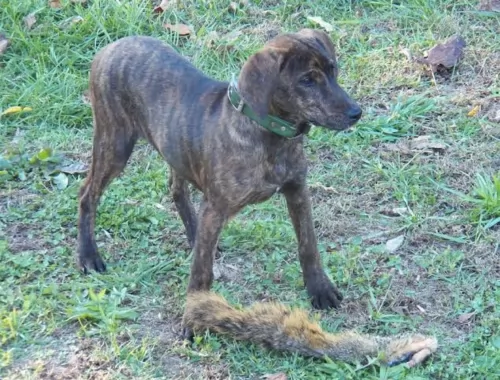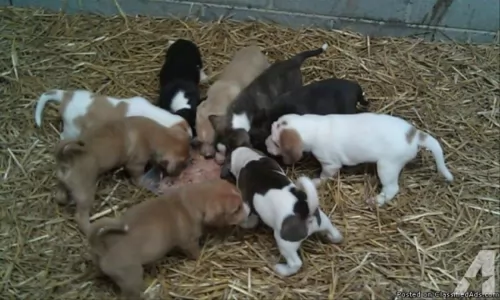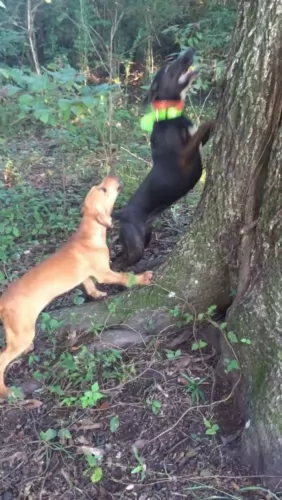 Petzlover
Petzlover Appenzell Mountain Dog is originated from Switzerland but Treeing Cur is originated from United States. Both Appenzell Mountain Dog and Treeing Cur are having almost same height. Both Appenzell Mountain Dog and Treeing Cur are having almost same weight. Both Appenzell Mountain Dog and Treeing Cur has almost same life span. Both Appenzell Mountain Dog and Treeing Cur has almost same litter size. Appenzell Mountain Dog requires Moderate Maintenance. But Treeing Cur requires Low Maintenance
Appenzell Mountain Dog is originated from Switzerland but Treeing Cur is originated from United States. Both Appenzell Mountain Dog and Treeing Cur are having almost same height. Both Appenzell Mountain Dog and Treeing Cur are having almost same weight. Both Appenzell Mountain Dog and Treeing Cur has almost same life span. Both Appenzell Mountain Dog and Treeing Cur has almost same litter size. Appenzell Mountain Dog requires Moderate Maintenance. But Treeing Cur requires Low Maintenance
 Hailing from the Appenzell region of Switzerland and known as the Appenzeller Mountain Dog or the Appenzeller Sennenhunde, this athletic breed of dog has a history which is debatable and which has several theories.
Hailing from the Appenzell region of Switzerland and known as the Appenzeller Mountain Dog or the Appenzeller Sennenhunde, this athletic breed of dog has a history which is debatable and which has several theories.
It is believed the dog is descended from Molossus.The Appenzeller Mountain Dog is one of the 4 recognized Swiss Sennenhunds, appearing to have descended from cattle dogs. The first breed club was founded in 1906 by Albert Heim. However, an early reference to the breed's predecessors was made in a book of 1853, where it refers to dogs in the Appenzell region.
In 1898 the Appenzeller Mountain Dog was shown at the first international dog show and was recognized internationally as a separate breed in 1989.
 The Treeing Cur dog is a mixed-breed, working dog which hails from the USA and recognized by the United Kennel Club in November 1998.
The Treeing Cur dog is a mixed-breed, working dog which hails from the USA and recognized by the United Kennel Club in November 1998.
They’ve always been used to tree animals such as squirrels, raccoons, bears, and even mountain lions. They were developed to be used as hunting and guarding dogs.
Aside from these good qualities, today the dog makes an excellent family companion.
 The Appenzell Mountain Dog is a medium-sized dog standing at between 47–58cm at the withers and weighing in at 22–32kg.
The Appenzell Mountain Dog is a medium-sized dog standing at between 47–58cm at the withers and weighing in at 22–32kg.
He is a heavy-built dog and sports a tri-color coat – black, tan and white. He has a double coat with the topcoat being shortish, thick and straight. He sheds throughout the year and isn’t hypoallergenic. He has small ears which are high set and which are floppy. The tail is long and curls when held high.
The Appenzell is an active breed who has been used to herding, fetching and working. Because of his energy levels, he won’t fit in well in a small home where his energy needs can’t be met. However wherever he is, he bonds closely with his human family and thrives on attention from them.
He isn’t known as an aggressive dog, but if as a working breed, he felt that the livestock he was guarding was under threat, he could exhibit some aggressiveness.
He gets on well with children in the home and other pets but is inclined to be wary of strangers. Just as with any other dog, training and socialization does wonders for him, making him relaxed and obedient around people and dogs.
 Standing at between 46 – 61cm in height and weighing between 14 – 27kg, the medium-sized Treeing Cur is athletic and muscular.
Standing at between 46 – 61cm in height and weighing between 14 – 27kg, the medium-sized Treeing Cur is athletic and muscular.
He has a short to medium-length double coat that can be in a number of colors. Red and white, tan and white, black and white, brindle, some freckling and bi-colored or tri-colored.
The eyes are mostly brown but can be green or blue too. They’re well-muscled and robust and have medium length floppy ears. The tail is mostly docked but is sometimes left long.
These dogs are alert and intelligent, being easy to train and wanting to please their owners, getting along well with all members of the family, including children and other dogs.
They’re strong-willed dogs and will require training and socialization if you want them to be well behaved wherever they are. He is intelligent so there won’t be any trouble with training him. He is very responsive to what his owner requires of him, with a desire to make their owners pleased with them.
 Herding dogs tend to be independent and somewhat reserved but the Appenzell Mountain Dog is social, outgoing and loving with his human family. When trained and socialized he gets on well with other pets as well as children in the home.
Herding dogs tend to be independent and somewhat reserved but the Appenzell Mountain Dog is social, outgoing and loving with his human family. When trained and socialized he gets on well with other pets as well as children in the home.
He is a working dog, and thrives on being active, so a good amount of exercise will be necessary. He is a courageous, affectionate dog and when you give him the right upbringing and treat him as he deserves to be treated, he becomes a splendid pet.
 The Treeing Cur is a working dog that loves all the action. He is an alert, intelligent dog, and being territorial and protective, he makes an excellent guardian dog too.
The Treeing Cur is a working dog that loves all the action. He is an alert, intelligent dog, and being territorial and protective, he makes an excellent guardian dog too.
They can show some aggression towards strangers and other dogs they don’t know. Apart from being an excellent hunting dog, the Treeing Cur loves to be around their human family, making loyal and loving companions.
 There are some health problems with dogs which are inherited. It is why some people insist on getting certificates from breeders to show that the parents were cleared of certain diseases such as hip and elbow dysplasia.
There are some health problems with dogs which are inherited. It is why some people insist on getting certificates from breeders to show that the parents were cleared of certain diseases such as hip and elbow dysplasia.
Certainly, it’s a known fact that many health problems can be prevented by the way you feed your dog and the way you raise him.
If you suspect your pet is suffering with an ailment that is making him lethargic and run-down, get him to the vet immediately.
 These dogs are very healthy and you’re not likely to have many vet bills when you bring one into your home.
These dogs are very healthy and you’re not likely to have many vet bills when you bring one into your home.
The Treeing Cur has floppy ears, and particularly if it's a dog that loves swimming, it will battle with moisture in the ears. Dogs with floppy ears don’t have good air-flow inside the ears like a dog with erect ears would have. This means that the dog is prone to ear infections.
This is such a common dog illness that can strike even young dogs. That is why it is important to check your dog over regularly for lumps and bumps on the body. Age increases the risk of cancer, so if you feel an unusual lump on your Treeing Cur, better to have your dog checked out at the vet.
 You want your Appenzell Mountain Dog to maintain his thick shiny coat, and because he sheds throughout the year, a good brushing twice a week will benefit him.
You want your Appenzell Mountain Dog to maintain his thick shiny coat, and because he sheds throughout the year, a good brushing twice a week will benefit him.
Dogs with hanging ears, such as this dog, are always more prone to ear infections, requiring more attention to the inside of the ears. Clean, dry ears resist ear infections.
The Appenzeller is a working dog, used to being active all day, so he will require a lot of exercise. He just loves being outdoors, and while he adapts to city- and country life, he will prefer living in the country. Take him for walks, play ball with him and allow him to run with you when you go jogging or cycling.
A young adult Appenzeller Sennenhunde will require a different calorie intake compared to a dog that has been spayed or neutered or a puppy that is still growing. You need to watch your dog’s age, his size and the particular season of his life he is in and adjust his food intake.
Kibble is good and well, and there are excellent brands packed with nutrients, but your furry friend will require brown rice, vegetables and cooked chicken mixed into his kibble from time to time as well as raw meat added in when possible.
An excellent diet is important for the wellbeing of your pet, and always ensure that fresh, cool water is available.
 Being an energetic working dog, this dog isn’t going to be content to be lying around. He is going to need regular exercise. He loves a brisk walk or even a run next to you when you go cycling.
Being an energetic working dog, this dog isn’t going to be content to be lying around. He is going to need regular exercise. He loves a brisk walk or even a run next to you when you go cycling.
When at home, you can consider ball games and hide and seek games with him. They just love to run, and if you live near a park, he will want to be off the leash if possible for some free running and sniffing around.
The short coat of the Treeing Cur will do well with a brush twice a week. While you brush your dog, check him out for ticks and fleas. Also, check him over for any unusual lumps.
Part of his grooming should be to check inside his ears for signs of redness, to make sure his eyes are nice and bright still and to see if he will let you look inside his mouth for bad teeth. Bad teeth can be a source of pain for him.
Caring for your Treeing Cur in a responsible manner means ensuring good food. Such an active dog will require proper nutrients so as to meet his energy and health needs.
Your Treeing Cur will need a high-quality commercially manufactured dog food for active dogs and they will also benefit from other simple cooked foods such as boiled chicken, brown rice and vegetables. The habit of feeding your Treeing Cur human foods such as chocolates, popcorn, peanuts, onions and spices could cause digestive upsets and possible vet fees.